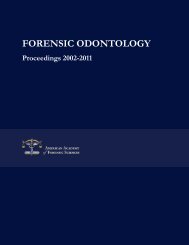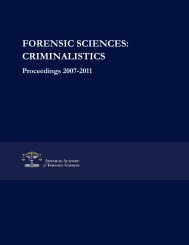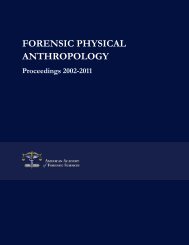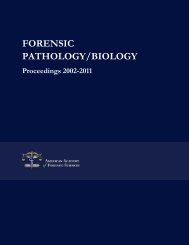FORENSIC TOXICOLOGY - Bio Medical Forensics
FORENSIC TOXICOLOGY - Bio Medical Forensics
FORENSIC TOXICOLOGY - Bio Medical Forensics
You also want an ePaper? Increase the reach of your titles
YUMPU automatically turns print PDFs into web optimized ePapers that Google loves.
of Criminal Procedure was likewise adopted in 1946. During the<br />
intervening years the Rules have been further modified, amended, and<br />
expanded.<br />
The term “discovery” encompasses the methods by which a party or<br />
a potential party to a lawsuit or prosecution obtains and preserves<br />
information regarding the action.<br />
The Federal Rules of Civil and Criminal Procedure specify in<br />
considerable detail the means by which discovery may be used by<br />
plaintiffs, prosecutors, and defendants to compel the production of such<br />
data, witnesses, and documents as are needed at trial. It will also be<br />
emphasized that, while most states have adopted part or most of the Federal<br />
Rules, due diligence is essential in determining what deviation from the<br />
Federal Rules exists in a given jurisdiction, if the litigation is going to be<br />
heard in a state court.<br />
Discovery in Civil matters is controlled by the Federal Rules of Civil<br />
Procedure, Rules 26 through 32. Discovery in criminal matters, greatly<br />
restricted by the constitutional protection against self-incrimination on the<br />
part of the defendant, is controlled by the Federal Rules of Criminal<br />
Procedure Rules 15 through 17 and Rule 26.2. Those instances where<br />
certain Federal Rules of Evidence are closely linked to the procedural rules<br />
will also be covered.<br />
In civil matters, the duty to disclosure is essentially equal between the<br />
parties. This presentation will closely examine FRCP Rule 26 in particular<br />
and how it relates to the retention of experts. It will provide clear<br />
distinction between the consulting expert and the testifying expert in their<br />
obligation to disclose information.<br />
Federal Rules, Discovery, Scientific Documents<br />
K35 Discovery Issues: Deposing<br />
the Forensic Toxicologist<br />
Harry L. Miles, JD*, Green, Miles, Lipton, & Fitz-Gibbon, LLP,<br />
77 Pleasant Street, PO Box 210, Northampton, MA 01096<br />
After attending this presentation, attendees will learn how to help the<br />
attorneys who engage them prepare them for written discovery requests,<br />
depositions and how to respond to discovery requests and questions so that<br />
the truth prevails. The presentation will aid the forensic community by<br />
helping the American justice system find the truth in contested criminal and<br />
civil matters. The presentation will focus upon the obligations of the<br />
experts and the attorneys to zealously represent their clients’ interests<br />
without violating their ethical obligations.<br />
This presentation will impact the forensic community and/or<br />
humanity by demonstrating the practical preparation needs and potential<br />
pitfalls discovery may impose upon a toxicologist.<br />
State and Federal rules of civil and criminal procedure impose<br />
discovery obligations on each party. Experts may have trouble reconciling<br />
their professional ethics with discovery practices under the rules of<br />
procedure. The presentation will discuss the practical needs of attorneys for<br />
expert opinions and the ways in which experts can provide those opinions<br />
in good conscience. In addition, the presentation will inform the attendees<br />
of the tricks, traps and pitfalls they may encounter when they respond to<br />
written discovery requests or testify at depositions. The manner in which<br />
deposition testimony may be used against an expert who testifies at trial<br />
will be demonstrated.<br />
Discovery, Experts, Ethics<br />
* Presenting Author<br />
K36 The Role of the Forensic Expert<br />
in the Discovery Deposition:<br />
Communication is Key<br />
David M. Benjamin, PhD*, 77 Florence Street, Suite 107, Chestnut Hill,<br />
MA 02467<br />
The goals of this presentation are to review rules of evidence and<br />
procedure essential to quashing abusive discovery requests, develop the<br />
ability to actively listen to questions, recognize unclear questions, and<br />
practice asking for clarification.<br />
This presentation will impact the forensic community and/or<br />
humanity by empowering forensic experts with information about how to<br />
prepare for a deposition, and providing instruction on the importance of<br />
listening to every word in a question before answering.<br />
The “Discovery” phase of litigation is designed for each party to<br />
inquire about various positions of the other side and request production of<br />
important documents. After documents have been exchanged, experts may<br />
be asked to prepare a report memorializing their findings and opinions. The<br />
parties exchange expert reports and in jurisdictions where expert<br />
depositions are allowed, each party may elect to take the deposition of one<br />
or more of the opposing experts. A deposition is sworn testimony outside<br />
the presence of a judge and jury. Any fact witness or expert who has been<br />
disclosed (designated to be called as a witness at trial) may be asked to<br />
submit to a deposition. If you are to be deposed, you will probably receive<br />
a subpoena duces tecum asking you to bring certain documents to your<br />
deposition. Responding to the subpoena requires collaboration between the<br />
deponent and the attorney who retained him/her in order to determine the<br />
propriety of the requested documents.<br />
Testifying as an expert in toxicology, or preparing your client for<br />
his/her deposition involves not only a thorough review of the facts of the<br />
case, but the ability to report one’s findings in an oral question and answer<br />
format. To be an effective witness, the deponent (individual being deposed)<br />
must be able to wade his/her way through the confrontational mine field of<br />
rhetoric and subterfuge that pervades much “lawyer-talk,” learn to<br />
recognize, and respond to trick questions. While experts have spent<br />
decades becoming proficient in their areas of specialty, attorneys have spent<br />
years learning how to phrase questions designed to elicit admissions and<br />
concessions, or to make you look foolish or unqualified.<br />
This presentation is designed to teach you to develop “Active<br />
Listening” skills you can use to recognize improper or poorly framed<br />
questions, and to empower you with insights into the deposition process<br />
that will permit you to avoid providing an even worse response to a poorly<br />
phrased question. The seminar will begin with a review of the roles an<br />
expert can play in the legal system and continue with a brief review of the<br />
rules of evidence and civil procedure which control discovery requests,<br />
subpoenas, and provide for limiting and quashing abusive discovery<br />
requests.<br />
The workshop will proceed to examine the objectives of a deposition<br />
and what types of questions to anticipate. Examples of good and bad<br />
deposition testimony and a review of an excellent deposition instruction<br />
provided by one attorney to a deponent will be presented.<br />
Responding to Subpoenas, Preparing for Your Deposition,<br />
Developing Active Listening Skills<br />
142






